Upwards of 1,000 workers, students, professionals and unemployed marched down Woodward Avenue in Detroit Friday afternoon in the first major event of the Occupy Detroit movement. The Detroit protest is being held in solidarity with the Occupy Wall Street movement initiated in New York.
Marchers, representing a wide cross-section of the working population in Detroit and surrounding suburbs, chanted, “We are the 99 percent.” Many held hand-lettered signs denouncing social inequality, corporate greed and budget cuts.
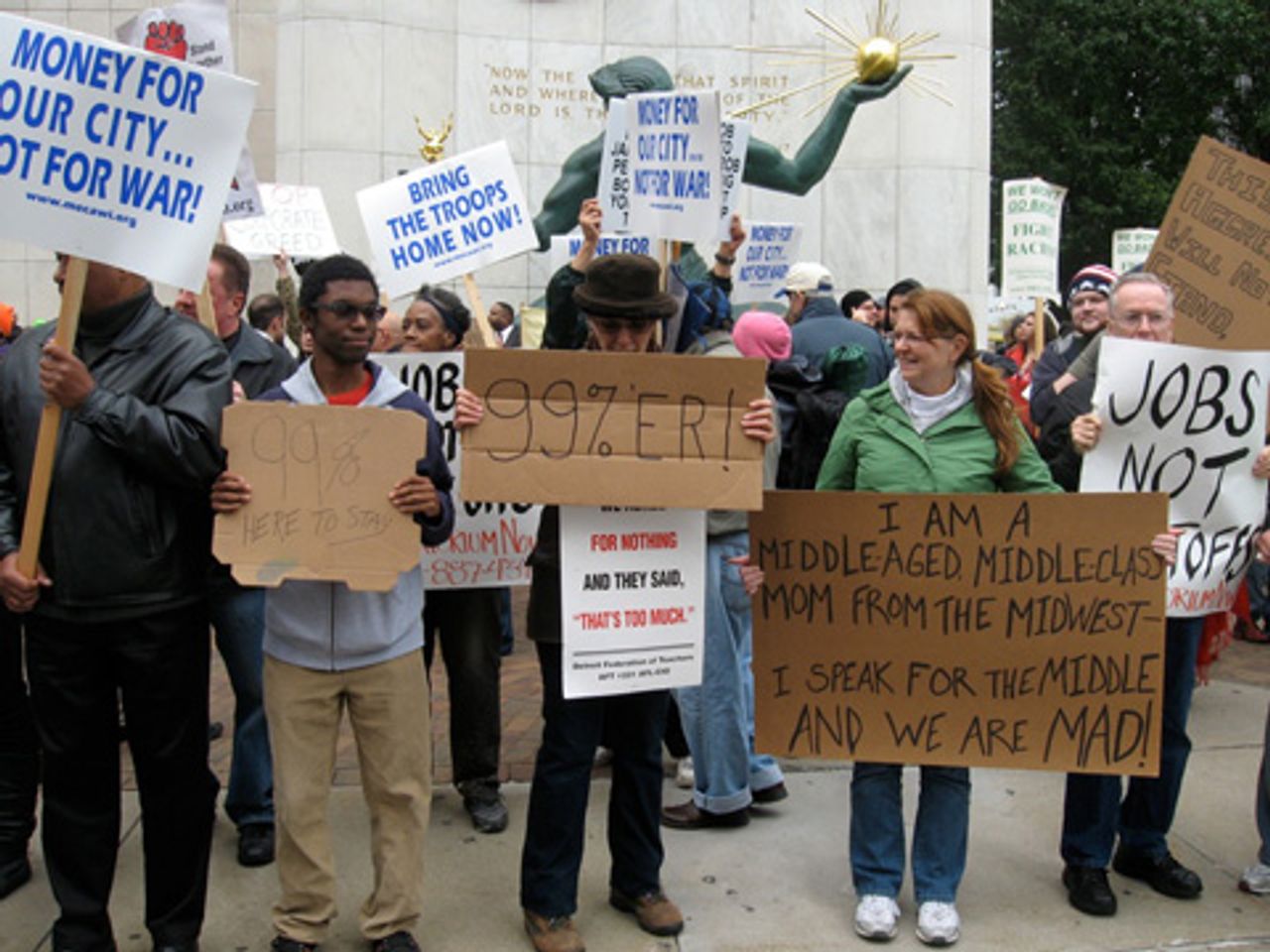
The march began at the Detroit Municipal building, ending at Grand Circus Park. Rally organizers say they plan to set up a tent city in the park where they intend to stay for 60 days.
The rally coincided with a visit by President Obama to the Detroit area. On Friday, Obama visited the General Motors Lake Orion Assembly plant with Korean President Lee Myung-bak to promote the pending US-South Korea Free Trade agreement. However, a rally organizer, Scott Purdy, stressed that the Occupy Detroit protest was not directed at the president. “This is not a political protest of any parties,” Purdy told the Detroit News.
Supporters of the Socialist Equality Party distributed hundreds of copies of a statement titled, “The way forward in the fight against Wall Street.” It stressed: “The demand for ‘no politics,’ which makes an appeal to the desire among workers and young people for a united struggle, itself conceals a political agenda—that is, opposition to any fight against the corporate controlled two-party system.”
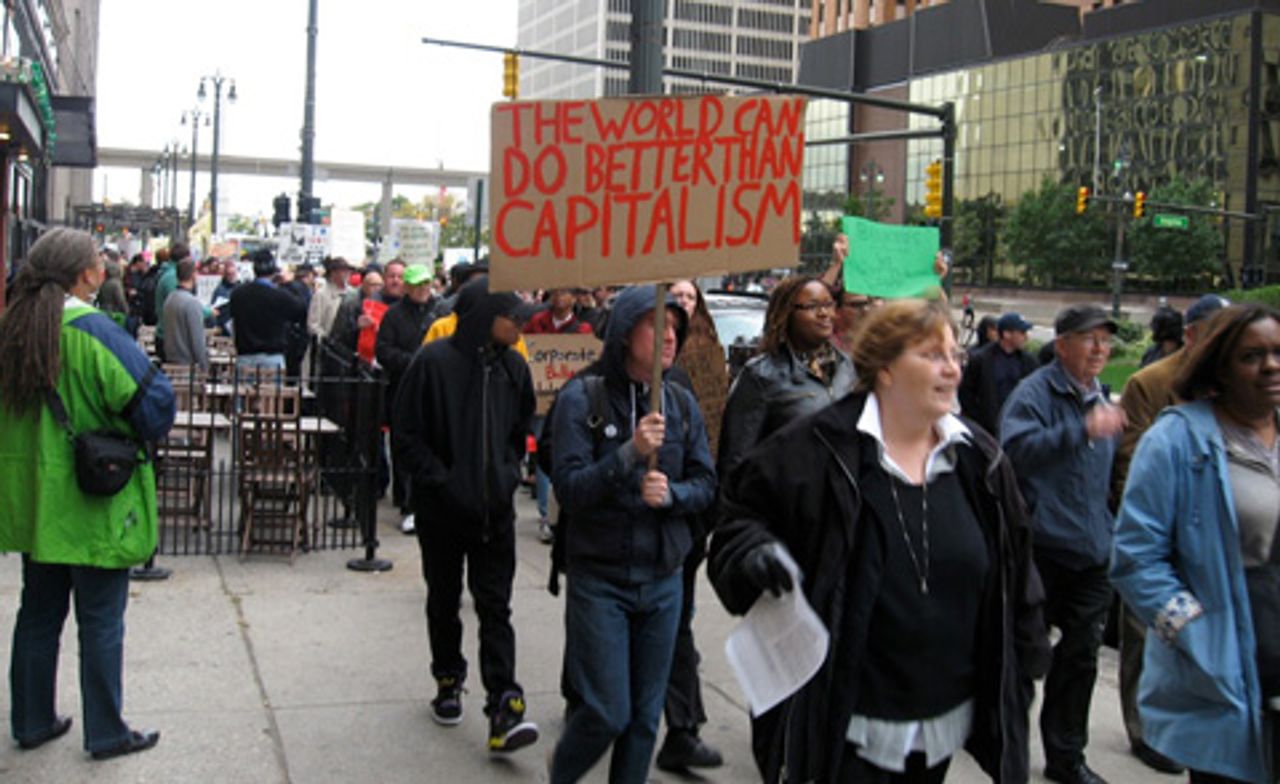
The statement continues, “Politics is about the struggle between opposing classes and social interests. The program of the ruling class—bank bailouts, social austerity, war and the destruction of democratic rights—must be opposed with a political program based on the independent interests of the working class.”
A World Socialist Web Site reporting team interviewed participants at the Occupy Detroit rally on Friday.
Mark, a bank worker, told the WSWS, “I came down today because of the injustice, the broadening chasm between the haves and the have-nots, the rich and the poor. The ever-declining middle class. The obscene level of executive compensation that exists in this country and many other countries. I was against the war from the beginning.
“I do think that no corporation should be exempt from taxes. Loopholes should be closed. The discrepancy between what the average taxpayer pays and what the rich pay needs to be closed. I am not exactly sure about the right way to do that, but I think it is a serious issue.”
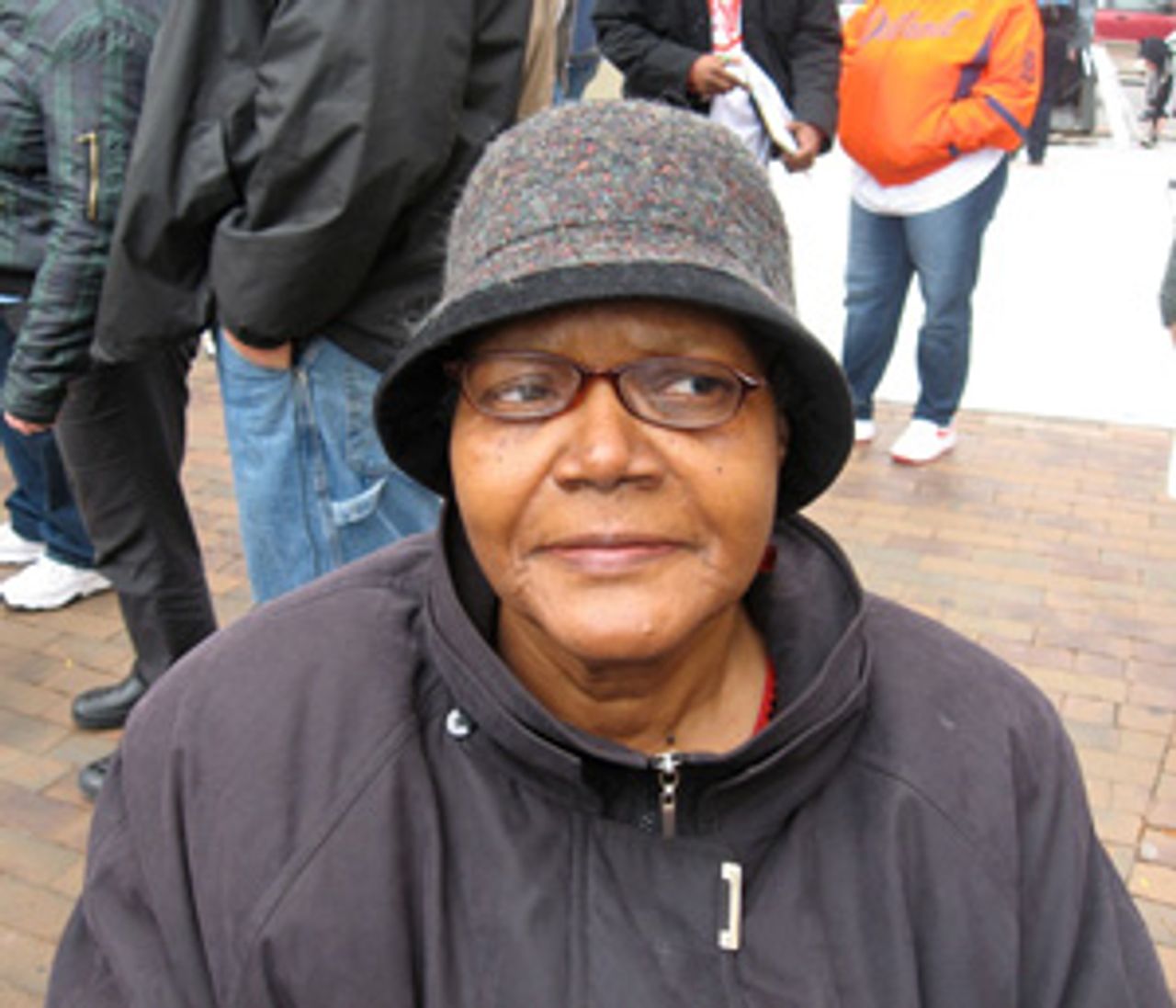 Willie B. Smith
Willie B. Smith Willie Smith, a retired clerical worker from Detroit, said, “When I was going to Wayne State University in the 1970s, I was taking a sociology class. My professor said we were moving toward a two-class society—the haves and the have-nots. But I didn’t think then that it would get this bad. The rich get richer and the poor are eliminated.”
Willie spoke about some of the immediate concerns that brought her and friends to the rally: “We are trying to make the problem known about the terrible bus service in the city. I go to the Detroit Medical Center at 2:30 and I don’t get home until after 5:00 because they don’t have buses with wheelchair access.
“We haven’t had a cost-of-living raise on Social Security since 2008 and prices are going up. They cut my food stamps from $81 to $10 last month.
“This two-party system is not working. I have never seen such a mean-hearted system. They are cutting elderly and children. They would like you to drop off the edge of the earth.”
Mike Montgomery, a 26-year-old Iraq war veteran, happened by the rally. He said, “In Detroit it’s all BS, to put it frankly. There’s so much homelessness. Nobody’s doing anything to help veterans or the homeless. You know in the 1960s, with the baby boomers, they rioted here. I think a good glimpse of what happened then is going to happen here again, especially because of what’s happening in these offices around here with these executives. Everybody in these offices is full of it, [Detroit Mayor] Dave Bing and [Governor] Snyder, all of them!”
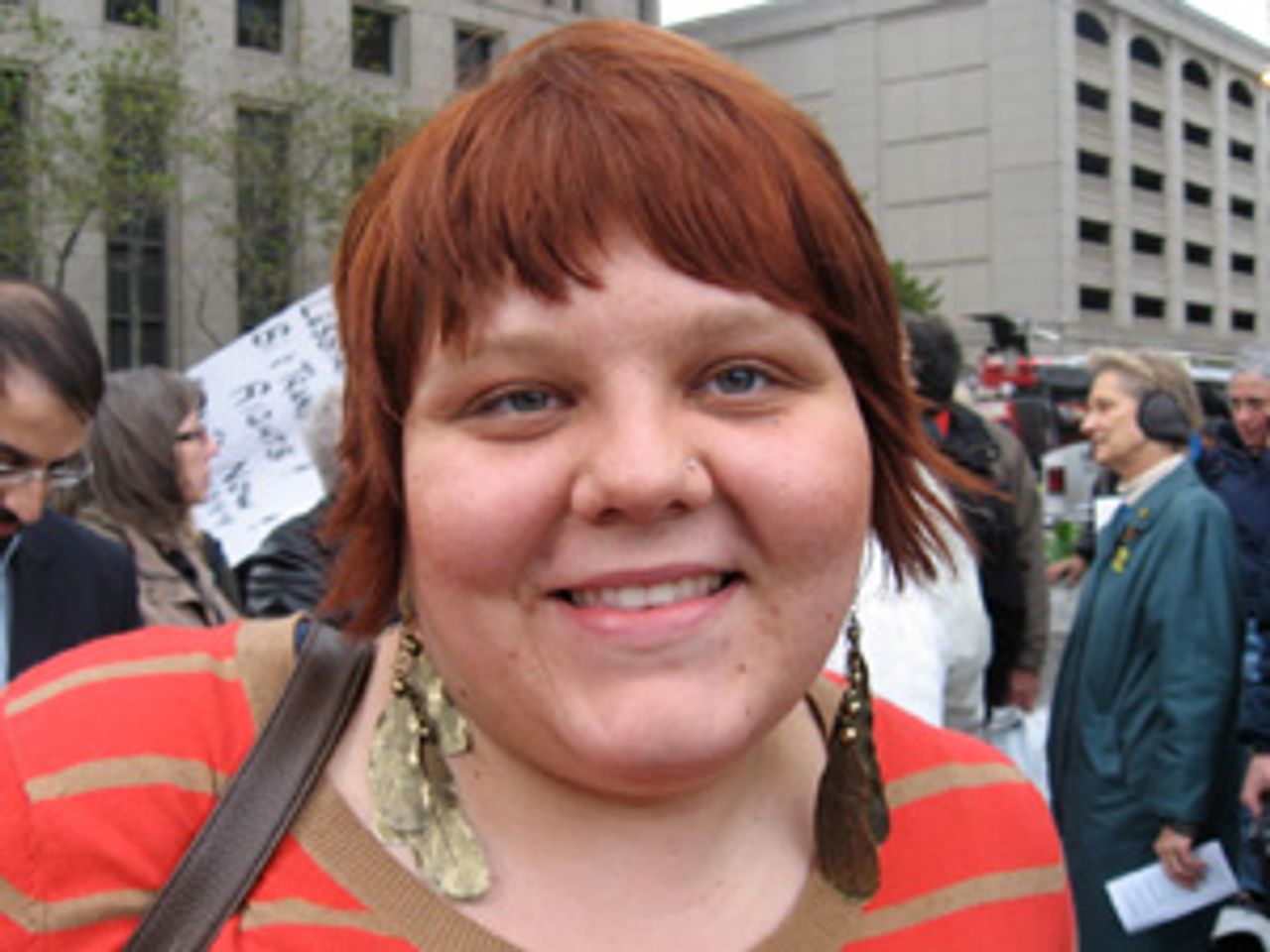 Becki Kenderes
Becki KenderesBecki Kerderes said, “I am in graduate school for social work. I work assisting people with the activities of daily living.
“I would love to be in New York now. I think inequality is the basis for everything that is going wrong. Everything can be linked to that.
“I didn’t have high expectations for Obama. I think we need to change the whole structure. I think that movements can effect social change—the civil rights movement, women’s suffrage. In the ’60s and ’70s you saw massive changes in policies. Change came from masses of people coming together.
“I think the Wall Street protests are very inspiring. I was starting to feel that the whole country was apathetic. I was glad to see there was some balance at last to the Tea Party.”
Members of the Reimer family—Heather, Hayley, Lynda and Steven—attended the protest. They spoke to the WSWS about the issues motivating them. Hayley, a student at Oakland Community College (OCC), lives in Highland Park. She told the WSWS, “I think the American dream is dead. It has become a nightmare. I live in one of the poorest cities in the country. The auto companies abandoned it.
“I go to OCC because I can’t afford to go anywhere else. What I would like to do is get a history degree and teach history, but that is probably not a good degree to get a job. So I will probably teach psychology.
“It sucks that the furthest left you can go is the Democrats. Corporations should not be able to donate to elections.”
Lynda, who lives in Hazel Park, is currently unemployed. She said, “We need more socialism and less capitalism. We are tired of inequality. I think what is happening is all crazy.”
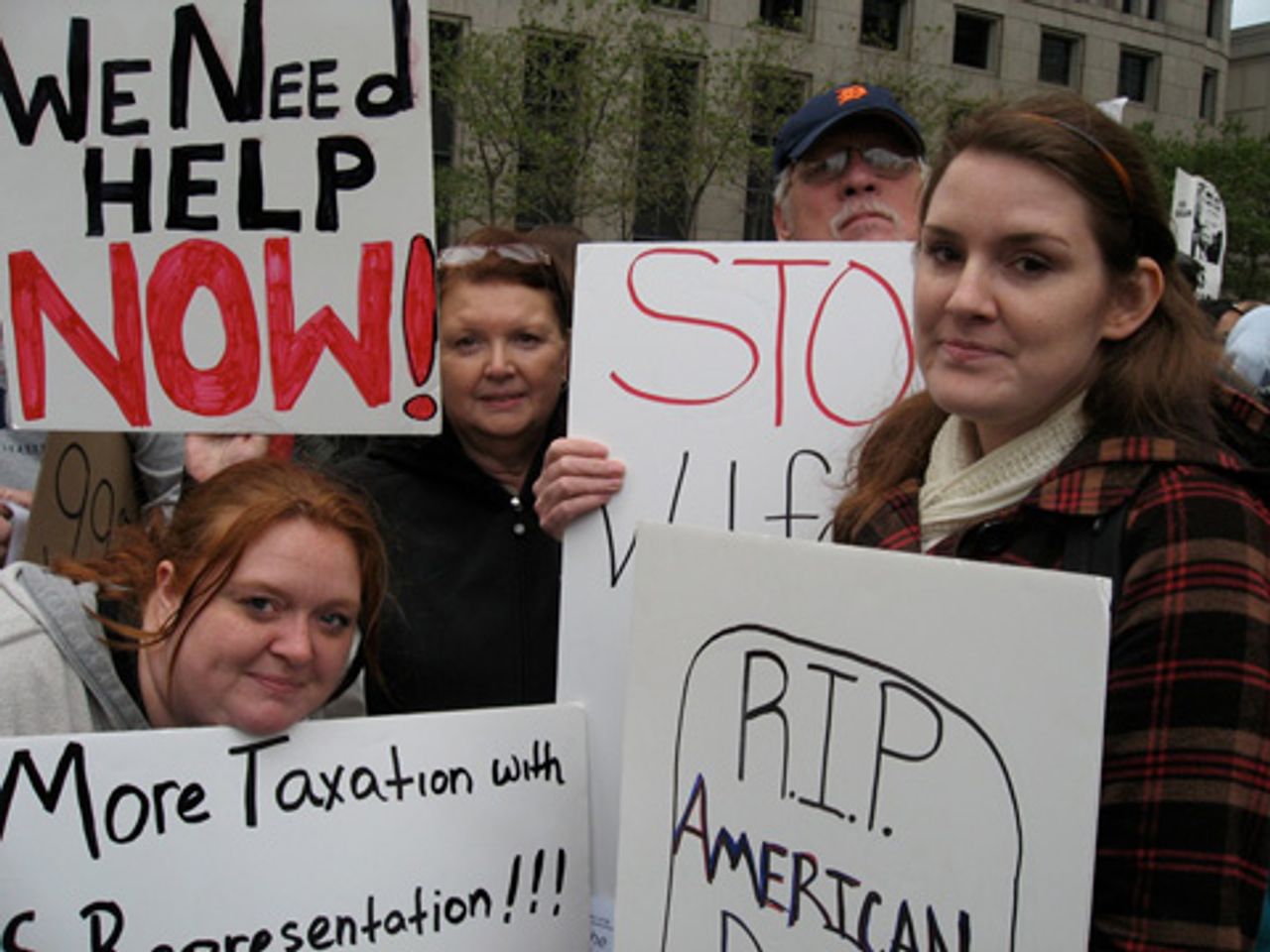 Heather Manning, Lynda Reimer, Steven Reimer, Hayley Reimer
Heather Manning, Lynda Reimer, Steven Reimer, Hayley ReimerHeather, also unemployed, added, “I think if we had more than two parties it would help.”
Rebecca, a graduate student, said, “I came here because I’m tired of the corporate control over the government; I’ve been tired of it for a long time. I’m really unhappy with the lack of oversight, particularly of institutions related to public health and the environment. We need a retooling of jobs.
“In Detroit the crisis started a long time before the crisis of 2008. But cities everywhere are strapped for cash. There’s been disinvestment in cities for decades, schools are failing, social services are failing, there’s no police. I mean, people are so poor that they’re stealing the copper from streetlights, and they face all kinds of public health problems. Detroit is a microcosm of what’s going on everywhere.”
When asked about the “no politics” format of the Occupy Detroit protest, she added, “These rallies are great, but there need to be concrete policies ... policies that counter the ones that exist presently.... Well, this is politics right? These concerns are all political issues in some way or another, so I don’t really understand what they mean by ‘no politics.’”
